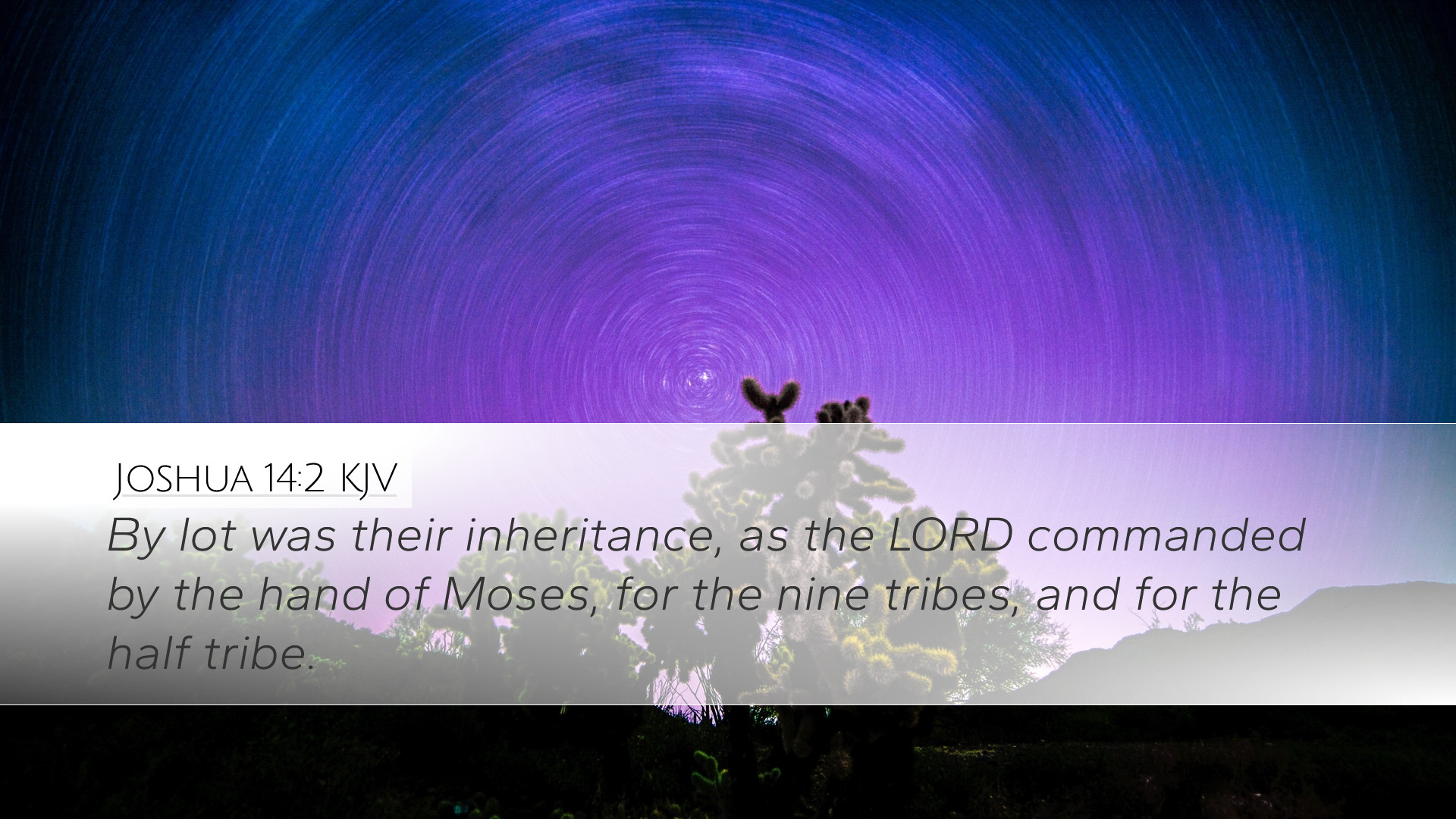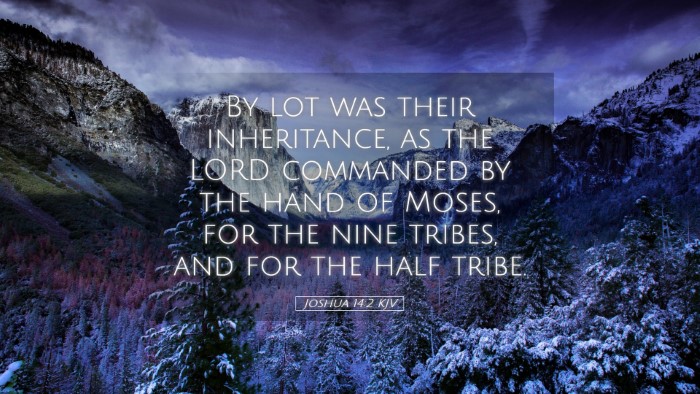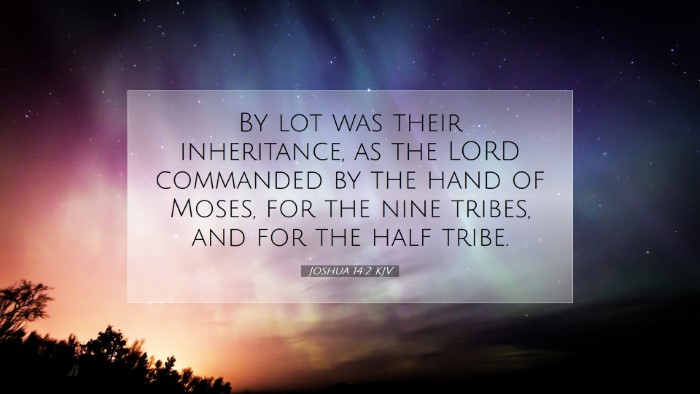Old Testament
Genesis Exodus Leviticus Numbers Deuteronomy Joshua Judges Ruth 1 Samuel 2 Samuel 1 Kings 2 Kings 1 Chronicles 2 Chronicles Ezra Nehemiah Esther Job Psalms Proverbs Ecclesiastes Song of Solomon Isaiah Jeremiah Lamentations Ezekiel Daniel Hosea Joel Amos Obadiah Jonah Micah Nahum Habakkuk Zephaniah Haggai Zechariah MalachiJoshua 14:2
Joshua 14:2 KJV
By lot was their inheritance, as the LORD commanded by the hand of Moses, for the nine tribes, and for the half tribe.
Joshua 14:2 Bible Commentary
Bible Commentary on Joshua 14:2
Joshua 14:2 states, "By lot was their inheritance, as the Lord commanded by the hand of Moses, for the nine tribes and the half-tribe." This verse encapsulates the principle of God's sovereignty in the distribution of the land to the Israelite tribes, underscoring the themes of inheritance, divine promise, and human response to God's directives.
Overview of the Context
This passage falls within the broader narrative of Israel's conquest and settlement in Canaan. The context involves the allocation of the land among the tribes of Israel, which was critical after their exodus from Egypt and wandering in the wilderness. The mention of "by lot" signifies a divinely ordained process, illustrating how the Israelites were to trust in God's will for their inheritance.
The Principle of Lot Casting
The casting of lots, as referenced in this verse, was a common method used by the Israelites to make decisions that were perceived to carry the weight of divine influence. Matthew Henry expounds on this, indicating that casting lots was a way to ensure that human desires and ambitions did not skew the inheritance assigned to each tribe. This process reflects a deep trust in God's governance.
- Divine Sovereignty: The lot was used to highlight God's ultimate control over the outcome, aligning with the theological theme of sovereignty in Scripture.
- Community Decision-Making: This process shows an early example of collective decision-making rooted in reliance upon God’s will, which was fundamental for Israel's unity and identity.
- Equity and Justice: The equitable distribution symbolizes God's justice, ensuring that no tribe was overlooked or unfairly treated.
The Inheritance of the Tribes
The significance of inheritance in Israelite culture cannot be overstated. In Adam Clarke's commentary, he notes that the land represents not only a physical territory but also a spiritual promise linked to the covenant established with Abraham, Isaac, and Jacob. This inheritance serves as a tangible reminder of God's faithfulness to his people.
He explores the implications for the tribes, emphasizing the importance of each tribe receiving their designated portion of land in accordance with God's commandments and the leadership of Moses. Clarke identifies this as a fulfillment of God's promise, enhancing the theological narrative of Israel's history.
- Covenantal Fulfillment: The allocation of land is directly related to God's covenant promises, demonstrating continuity in His plans for His chosen people.
- Identity and Belonging: Each tribe's inheritance contributes to their unique identity and sense of belonging within the larger community of Israel.
- Responsibility Towards the Land: The tribes were not just recipients of land but were also charged with the responsibility of stewardship, reminding us that blessings from God come with obligations.
Lessons for Contemporary Readers
For pastors, students, and theologians today, Joshua 14:2 presents several instructive points:
- Faith in God's Provision: The reliance on divine decision-making through lots encourages believers to trust in God's provision and timing, even amidst uncertainty.
- Waiting on the Lord: This process necessitated patience, a crucial virtue in the Christian walk. It teaches the importance of waiting on God's perfect plan rather than rushing ahead.
- Communal Identity: Modern churches can reflect on their identity as a part of the body of Christ, recognizing the unique roles and gifts given to each member for the health of the community.
- Stewardship: The understanding of our inheritance in Christ compels us to act responsibly in stewarding not just resources, but also spiritual gifts, opportunities, and community relationships.
The Role of Human Agency
Further analysis reveals the delicate balance between divine sovereignty and human agency. While the lot signifies God's control, the responsibility of leaders and the community at large to conduct themselves in obedience is crucial. Albert Barnes notes this balance, emphasizing the need for vigilance and fidelity among the Israelites as they settled into their possessions.
Such insights call on theologians and pastors to reflect on how God's providence operates within the framework of human decision-making. It challenges contemporary believers to engage actively with God's commands while resting in the assurance of His overarching sovereignty.
Conclusion
In summary, Joshua 14:2 serves as a rich source of theological reflection on divine justice, the importance of inheritance, and the faithful execution of God's promises. The insights from Matthew Henry, Albert Barnes, and Adam Clarke combine to illuminate the timeless principles embedded within this text. For those engaged in pastoral ministry or scholarly pursuits, this verse not only narrates a historical event but also invites deeper reflection on faith, community, and divine purpose.


